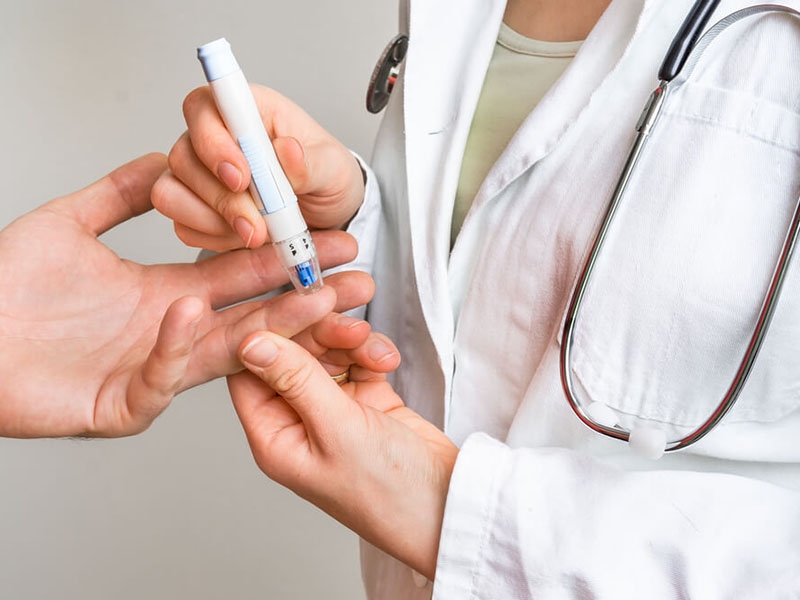
Fasting blood glucose
A Fasting Blood Glucose Test is a diagnostic procedure used to measure the amount of glucose (sugar) in your blood after a period of fasting, typically for 8 to 12 hours. This test is commonly used to diagnose diabetes, monitor blood sugar levels in individuals with diabetes, and evaluate how well the body manages glucose. Glucose is the body’s main source of energy, and maintaining proper blood sugar levels is critical for overall health.
The test is straightforward and involves taking a small sample of blood from a vein, usually in the arm, which is then analyzed to determine glucose levels. The test is done in the morning after the patient has fasted overnight, ensuring that food does not affect the results.
Types of Fasting Blood Glucose Tests
Standard Fasting Blood Glucose Test
The Standard Fasting Blood Glucose Test is the most common type of test used to diagnose diabetes or prediabetes. In this test, blood sugar levels are measured after a period of fasting to determine if glucose levels are within the normal range. Normal fasting glucose levels are typically below 100 mg/dL, while levels between 100 and 125 mg/dL may indicate prediabetes, and levels above 126 mg/dL suggest diabetes.
This test is essential for early detection of diabetes, allowing healthcare providers to implement preventive measures or treatment plans before complications arise. If abnormal glucose levels are detected, the healthcare provider may recommend further testing, such as an oral glucose tolerance test (OGTT) or A1C test, to confirm the diagnosis and assess the severity of the condition.
Fasting Blood Glucose with Oral Glucose Tolerance Test (OGTT)
In some cases, a Fasting Blood Glucose Test is combined with an Oral Glucose Tolerance Test (OGTT) to provide a more comprehensive assessment of the body’s ability to process glucose. In this test, the fasting glucose level is measured first, followed by the administration of a sugary drink. Blood glucose levels are then measured at regular intervals over a two-hour period to see how well the body responds to the influx of sugar.
The OGTT is particularly useful for diagnosing gestational diabetes in pregnant women and assessing individuals who have borderline fasting glucose levels. It provides a detailed look at how the body metabolizes sugar and helps identify abnormalities that may not show up in a standard fasting test. The test typically takes around two hours to complete and requires fasting prior to the initial blood draw.
Advantages of the Fasting Blood Glucose Test
The fasting blood glucose test offers several key benefits:
- Accurate and reliable: By measuring blood sugar levels after fasting, the test provides a clear and accurate picture of how well the body manages glucose without the interference of recent meals.
- Early detection: This test allows for the early detection of prediabetes and diabetes, giving healthcare providers the opportunity to intervene with lifestyle changes or medications before complications arise.
- Simple and quick: The procedure is simple and takes only a few minutes for the blood draw. Results are usually available within 24 hours, allowing for timely diagnosis and treatment.
The test itself takes only about 10 to 15 minutes, and since it's a fasting test, it’s typically done in the morning. After the test, patients can resume eating and drinking normally.
Pre- and Post-exam Care
Pre-exam care: To ensure accurate results, patients are required to fast for at least 8 to 12 hours before the test. During this time, only water is allowed. It’s important to avoid food, sugary beverages, and any alcohol prior to the test. It’s also essential to inform your healthcare provider about any medications you’re taking, as some may affect blood sugar levels.
Post-exam care: After the test, patients can eat and drink as usual. There is no recovery time needed, and patients can return to their regular activities immediately. If blood sugar levels are abnormal, your healthcare provider will discuss next steps, including lifestyle changes, medications, or additional testing.
Frequently Asked Questions (FAQ)
1. How long do I need to fast before a fasting blood glucose test?
You should fast for at least 8 to 12 hours before the test. Only water is allowed during this time, and you should avoid eating, drinking anything other than water, and smoking.
2. What happens if my fasting blood glucose levels are high?
If your glucose levels are higher than normal, your healthcare provider may recommend additional tests to confirm a diagnosis of diabetes or prediabetes. They may also suggest lifestyle changes, medications, or further monitoring to help manage your blood sugar levels.
3. Can I take my regular medications before the test?
It’s important to inform your healthcare provider of any medications you are taking, as some can affect blood sugar levels. Your doctor will provide instructions on whether to continue or pause medications before the test.
Fasting Blood Glucose Services at Clinic Consultation
At Clinic Consultation, we offer comprehensive fasting blood glucose testing to help you monitor and manage your blood sugar levels. Whether you're concerned about diabetes or need routine monitoring, our team provides accurate, timely results in a professional and supportive environment.
Book an appointment today to schedule your fasting blood glucose test at Clinic Consultation and take control of your health.
Click the button below to schedule your appointment online.